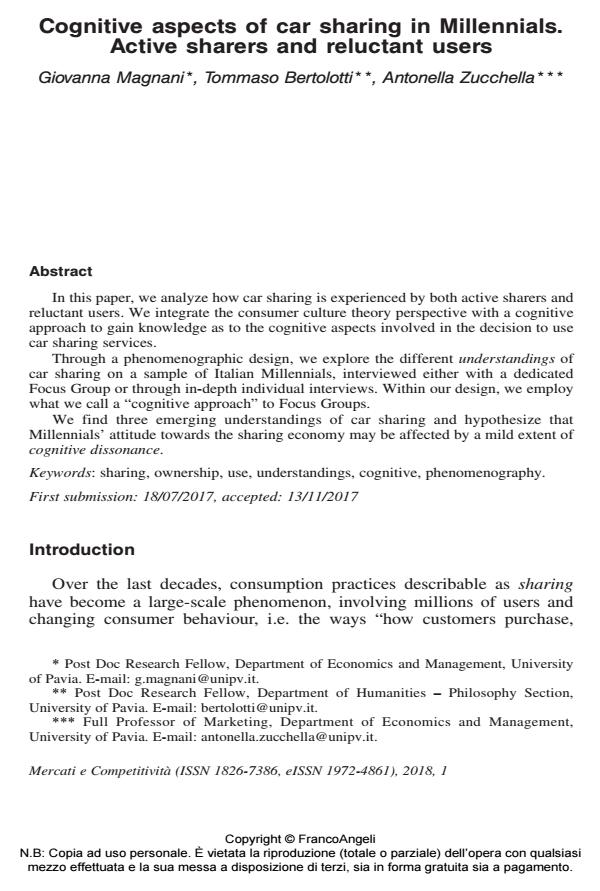Cognitive aspects of car sharing in Millennials. Active sharers and reluctant users
Journal title MERCATI & COMPETITIVITÀ
Author/s Giovanna Magnani, Tommaso Bertolotti, Antonella Zucchella
Publishing Year 2018 Issue 2018/1
Language English Pages 24 P. 39-62 File size 1044 KB
DOI 10.3280/MC2018-001004
DOI is like a bar code for intellectual property: to have more infomation
click here
Below, you can see the article first page
If you want to buy this article in PDF format, you can do it, following the instructions to buy download credits

FrancoAngeli is member of Publishers International Linking Association, Inc (PILA), a not-for-profit association which run the CrossRef service enabling links to and from online scholarly content.
In this paper, we analyze how car sharing is experienced by both active sharers and reluctant users. We integrate the consumer culture theory perspective with a cognitive approach to gain knowledge as to the cognitive aspects involved in the decision to use car sharing services. Through a phenomenographic design, we explore the different understandings of car sharing on a sample of Italian Millennials, interviewed either with a dedicated Focus Group or through in-depth individual interviews. Within our design, we employ what we call a "cognitive approach" to Focus Groups. We find three emerging understandings of car sharing and hypothesize that Millennials’ attitude towards the sharing economy may be affected by a mild extent of cognitive dissonance.
Keywords: Sharing, ownership, use, understandings, cognitive, phenomenography
- 2021 IEEE 6th International Forum on Research and Technology for Society and Industry (RTSI) Ankit R. Patel, Flora Ferreira, Sergio Monteiro, Ana Carolina Silva, Wolfram Erlhagen, Estela Bicho, pp.194 (DOI:10.1109/RTSI50628.2021.9597265)
- Lived experiences about car sharing in young adults: Emerging paradoxes Giovanna Magnani, Beatrice Re, in Italian Journal of Marketing /2020 pp.207
DOI: 10.1007/s43039-020-00009-2 - Identification of the Factors Affecting the Frequency of Online Shopping of Millennial and Post-Millennial consumers Richard Fedorko, Veronika Škerháková, Radovan Bačík, Viktória Ali Taha, Denis Tir, in GATR Journal of Business and Economics Review /2022 pp.40
DOI: 10.35609/jber.2022.6.4(5) - Spare time use: profiles of Italian Millennials (beyond the media hype) Simone Del Sarto, Michela Gnaldi, in Statistical Methods & Applications /2022 pp.1403
DOI: 10.1007/s10260-022-00626-5 - Sustainability and Shared Mobility Models Georgina Santos, in Sustainability /2018 pp.3194
DOI: 10.3390/su10093194 - Marketing in Culturally Distant Countries Giovanna Magnani, pp.63 (ISBN:978-3-031-04831-9)
- Differences in the perceived financial risk factors between digital natives in the e-commerce Richard Fedorko, Veronika Skerhakova, Stela Markova, Radovan Bacík, Lubomir Fejercak, in Marketing and Management of Innovations /2021 pp.137
DOI: 10.21272/mmi.2021.4-11
Giovanna Magnani, Tommaso Bertolotti, Antonella Zucchella, Cognitive aspects of car sharing in Millennials. Active sharers and reluctant users in "MERCATI & COMPETITIVITÀ" 1/2018, pp 39-62, DOI: 10.3280/MC2018-001004